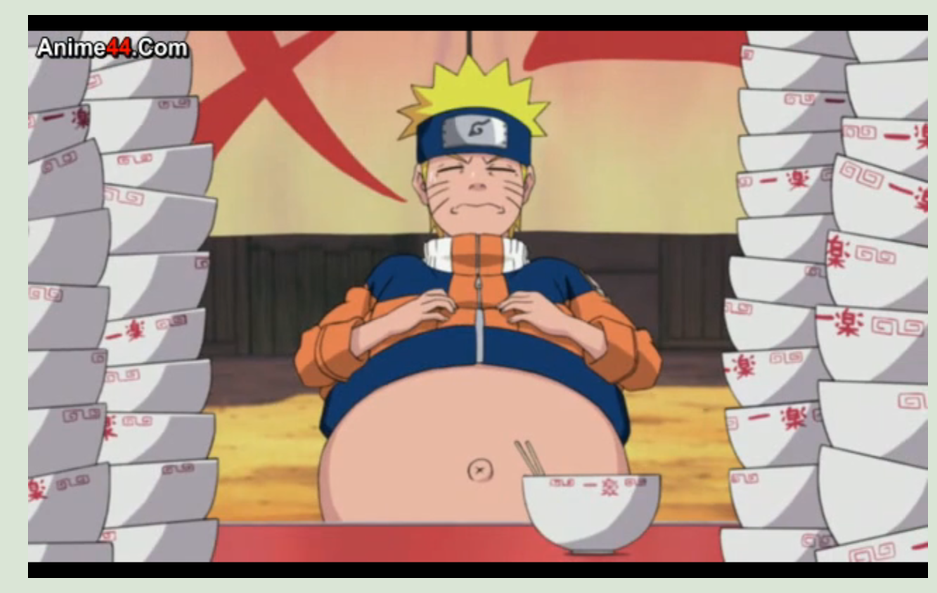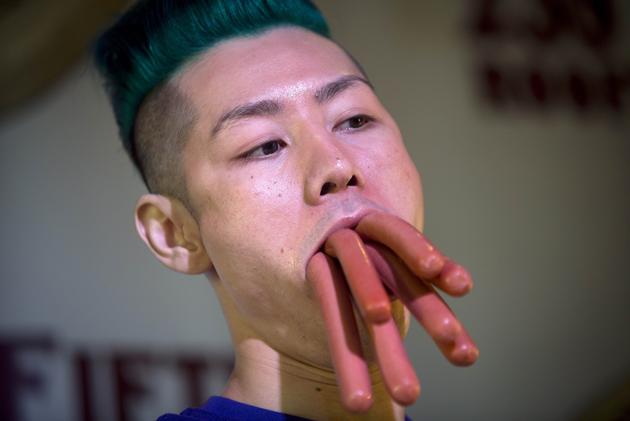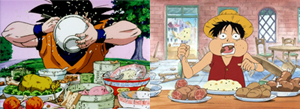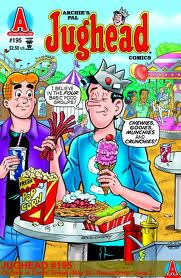Most Shōnen shows, at least, are probably following Dragon Ball Z
Dragon Ball Z was the starting point for a great deal of the anime that followed it. Many of the best-known anime draw heavily from Dragon Ball Z, by direct admission of the creators.
One Piece was so inspired, according to Wikipedia.
Naruto was also probably influenced by Dragon Ball Z:
Masashi Kishimoto: At some point between second and fourth grade I got
into Akira Toriyama Sensei’s Dr. Slump anime and Dragon Ball manga. I
loved his characters. I was especially attached to Dr. Slump’s Arale
and Dragon Ball’s Goku.
Of course, both of these shows feature heavy eaters. Here's Naruto, for example:

Never underestimate the influence of a single trailblazer. Where Dragon Ball Z goes, dozens or hundreds of other anime will follow, and that includes big eaters.
Another factor could be the preeminence of Japan in competitive eating
If there is some component of Japanese culture that led to the portrayal of huge eaters in anime, it is most likely the popularity of competitive eating.
The most famous competitive eater in the world hails from Japan: Takeru Kobayashi.
That would be this guy:

Yes, that really is one mouthful for him.
Of course, Kobayashi postdated Dragon Ball Z. However, he certainly could have inspired a lot of anime since then.
More importantly, the popularity of competitive eating in Japan predates Kobayashi's arrival. The show TV Champion started in 1992, and often featured eating contests. From the previous link:
Shows with eating contests have traditionally been very popular in
Japan. Prime Time shows like Food Battle Club and TV Champion are
sometimes among the top ranked shows in their time slots. Shows with
contestants slurping down bowls of ramen and inhaling 6-foot-long hot
dogs were very popular until 2002, when a junior high school student
died after choking on a bread while engaging in a speed eating contest
with friends at lunch time. After that all eating competition were
yanked form television in Japan.
In 1997, Hirofumi Nakajima won the world's most famous hotdog-eating contest, and he, Kobayashi, and Kazutoyo Arai won many more times in the succeeding years. Miki Sudo, although an American, spent much of her childhood in Japan, and won the woman's division of this same contest.
According to George Shea, the president of Major League Eating:
Japan has a long tradition of eating contests. By that, I mean a
couple of decades. In the early 1980s, Japan sent a couple of eaters
to Coney Island and they won a few contests. So the [championship
prize] Mustard Yellow Belt was in Japan and was actually lost over
there for several years because the defending champion didn’t come
back. Finally, in a special one-on-one competition in 1993, American
Mike DeVito beat Japan’s Orio Ito, winning the belt back for the
United States. Then Hirofumi Nakajima won it back for Japan in 1997.
American Steve Keiner won once in 1999. And then there was Kobayashi.
As far as I can tell, many in Japan have been hooked on eating contests since before even Dragon Ball Z. And with the ascendancy of Kobayashi over the last decade and a half, eating gags were bound to become more common in Japanese anime.
Benkei...A Mythological Basis?
Benkei is a popular Japanese folkloric character, a warrior who would not be out of place in an anime or manga. He is said to have held a bridge, killing 999 soldiers sent against him.
According to a Handbook of Japanese Mythology, his strength was that of a hundred men, such that he could hammer an anvil into the ground or dislodge a temple bell with a kick. But perhaps more worth noting is what it says about Benkei's tremendous appetite:
His price for returning the bell (he agreed to return it only after
the intercession of his abbot) was a satisfactory meal. His
depredation emptied the temple's larder and cellar. The cauldron from which he ate can still be seen in Miider today. He was not, apparently, a dainty eater, and the marks of Benkei's teeth are are on the cauldron still.
Mythological or religious antecedents can have a powerful effect on culture, with Christ being the inspiration for a whole array of self-sacrificial heroes, or Gilgamesh inspiring pretty much everyone. Benkei is a fairly popular character. Could his appetite have been the inspiration for early anime characters with bottomless stomachs?




